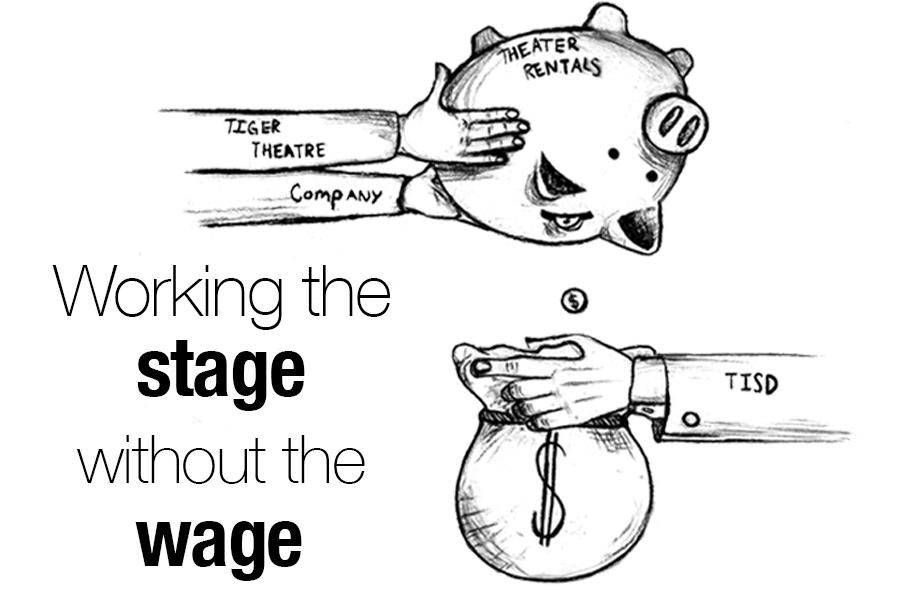Working the stage without the wage
May 24, 2016
A rental group appears, and a weary coalition of students appears at the catacombs of the theatre to attend to them. They work long, hard hours, and at the end of the day, they get nothing to show for it.
These students are members of the Tiger Theatre Company who run the technical equipment for any group renting the use of the Sullivan Performing Arts Center and John Thomas Theatre. Students for technical theater classes are required to log 24 out of school hours as a grade, but frequently this minimum is achieved by November with some students amassing more than 300 hours.
Students spend their time volunteering to work tech for any and every rental show that comes through the John Thomas Theatre anyway. Their reasoning is simple: no one else can do it. If no one volunteers, the technical director winds up managing the rental alone, assuming a literally unbearable workload.
These students also love technical theater, and many can fondly acquire amazing memories and bonds forged in the fire of a 36-work hour weekend. The system is efficient. Students get countless hours of real world experience that makes them experts in solving problems.
All of this is nice, except for one thing: none of the money from rentals goes into the theater’s club account. The theater belongs to the school district, not the Tiger Theatre Company, so when TTC students put in 40 plus hours a week, TISD gets the cash.
According to TISD Director of Public Relations Tina Veal-Gooch and Chief Financial Officer Deidra Reeves, money for rentals goes into the TISD general fund where it is intermingled with all of the district’s revenue sources. This fund pays for all costs of TISD, of which the PAC is a tiny portion.
On paper, everything looks normal. In reality, however, students are working for no pay, with no say and no reward for their organization. TISD schedules many of the rentals, ignores the fact that about three students work for every second of every single one, then collects the cash at the end. This treats the students like unpaid laborers.
There are many ways injustice could be averted. For starters, some money from rentals could go into the Tiger Theatre Company to actually benefit the students earning it. As of right now, rental rates for the John Thomas Theatre are significantly lower than rates for comparable venues. If this is corrected, the cost to rent the theater could cover everything from utilities to equipment to the manpower present. Once the portion for utilities and janitorial help (kindly provided by the school district) is paid, the rest could go to the Theatre Company/THS Drama Club to benefit the students who earned it.
This solution would also help fix some problems caused by rentals in the theater. Money could go toward fixing or replacing equipment that overuse and abuse from “guests” has ruined. Money could also go toward helping the Tiger Theatre Company do things for the students who drive it: anything from college show field trips to food during the painfully long rentals that they work.
As it stands now, administration is working on a solution, but nothing is set in stone. Until this solution appears, students do the work while TISD gets the cash. In other activities–most notably football–profit from student work goes back to benefit those students. Because technical theater is obscure and sequestered away to odd hours at the top of the hill, no one seems to care that these students are acting more like unpaid employees than volunteers for their theater.



















